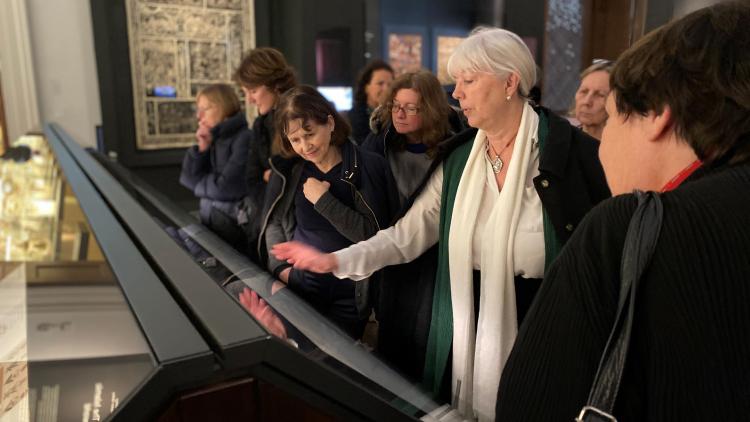BA Japanese and...


Key information
- Duration
- 4 years
- Start of programme
- September 2025
- Attendance mode
- Full-time
- Location
- Campus
- Fees
-
Home: £9,535
International: £22,870 - Entry requirements
-
AAA-ABB
For joint degrees, the offer is based on the subject with the higher entry requirements.
Contextual: AAB-BBB
-
See undergraduate entry requirements and English language requirements for international and alternative entry requirements.
Course overview
The BA Japanese and… programme provides you with the highest level of competence in all aspects of the written and spoken language, as well as an introduction to both classical and modern Japanese culture in combination with another subject.
From the study of contemporary Japanese society, film and popular culture to pre-modern literature and history, the BA Japanese is suitable for both absolute beginners as well as those with some prior knowledge of the Japanese language. If you already have prior knowledge of Japanese, you must sit a placement test in welcome week which will determine your entry level. Further information about these placement tests will be sent out to successful applicants before the start of the academic year.
Students will spend the third year of study in Japan furthering their language proficiency and understanding of Japanese society and culture.
Why study Japanese Combined Honours at SOAS?
- SOAS is ranked 12th in the UK for Modern Languages (QS World University Rankings 2023).
- We're ranked 6th in the UK for employability (QS World University Rankings 2023).

Use our combined courses tool to see a breakdown of course structure
Key information set data
Teaching and learning
All full-time undergraduate programmes consist of 120 credits per year, in modules of 60, 30 or 15 credits. They are taught over 10 or 20 weeks. The programme structure shows which modules are taught over one term or the full year. It also shows which modules are compulsory and which are optional.
Contact hours
As a rough guide, 1 credit equals approximately 10 hours of work. Most of this will be independent study. It will also include class time, which may include lectures, seminars and other classes. Some subjects, such as learning a language, have more class time than others.
Year abroad
All students spend their third year in Japan at one of the Japanese universities listed below, following successful completion of their second year. Please note that not all universities will have places available every year.
Tokyo
- Hitotsubashi University
- International Christian University
- Keio University
- Meiji University - 明治大学
- Ochanomizu University (women only)
- Sophia University
- Tokyo University of Foreign Studies - 東京外国語大学
- Waseda University
Nagoya
Kyoto
Osaka
Kobe
Hokkaido
SOAS Library
SOAS Library is one of the world's most important academic libraries for the study of Africa, Asia and the Middle East, attracting scholars from all over the world. The Library houses over 1.2 million volumes, together with significant archival holdings, special collections and a growing network of electronic resources.
Pre-entry reading
- B. Frellesvig, A History of the Japanese Language (Cambridge University Press, 2011)
- K. Friday, Japan Emerging: Premodern History to 1850 (Westview Press, 2012)
- C. Gerteis and T.S. George, Japan Since 1945: From Postwar to Post-bubble (Bloomsbury, 2013)
- C. Goto-Jones, Modern Japan: A Very Short Introduction (Oxford University Press, 2009)
- J. Hendry, Understanding Japanese Society (Routledge, 2012)
- M.B. Jansen, The Making of Modern Japan (The Belknap Press of Harvard University Press, 2000)
- H. Shirane, T. Suzuki, and D. Lurie (eds.), The Cambridge History of Japanese Literature (Cambridge University Press, 2015)
- P. Varley, Japanese Culture (University of Hawai’i Press, 2000)
Fees and funding
Fees for 2025/26 entrants per academic year
| Programme | Full-time | |
|---|---|---|
| Home students | Overseas students | |
| BA, BSc, LLB | £9,535 | £22,870 |
| BA/BSc Language year abroad | £1,385 | £11,430 |
See undergraduate fees for further details.
Employment
Graduates from the Department of East Asian Languages and Cultures develop competencies in intercultural awareness, analysis and communication. Demand for specialists with advanced proficiency in the languages of China, Japan and Korea has significantly increased in recent years, and graduates with these skills are highly sought after by employers.
Recent graduates have been hired by organisations including:
- Accenture
- Amazon
- Bloomberg LP
- Department for Work and Pensions
- European Alliance for Human Rights in North Korea
- European Commission
- ITN
- Japanese Government
- Korea Trade Centre (KOTRA)
- KPMG
- Mizuho Bank
- Nagahama Board of Education
- Nanjing Museum
- Pinsent Masons LLP
- PwC
- Seoul Metropolitan Government
- Shelterbox
- United Nations Development Programme
Find out about our Careers Service.



